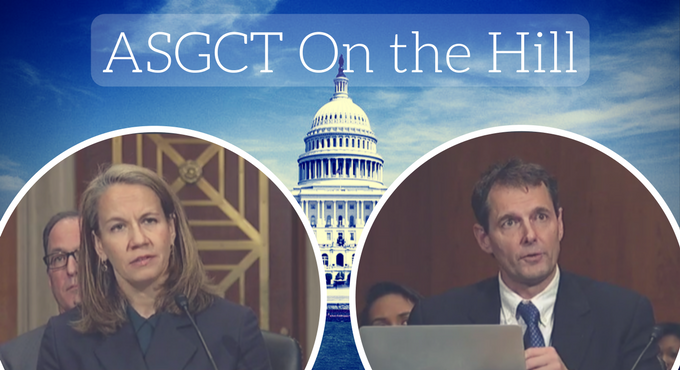ASGCT Members Inform the Senate HELP Committee About Gene Editing
ASGCT Staff - November 16, 2017
ASGCT leaders and members highlighted the innovative, durable, and potentially curative nature of gene editing at a Nov. 14 hearing with the Senate Committee on Health, Education, Labor, and Pensions.

At a Nov. 14 hearing on gene editing technology, the Senate Committee on Health, Education, Labor, and Pensions (HELP) listened to testimony from experts in the field about scientific, regulatory, and ethical aspects of the topic. Two of the three invited witnesses at the hearing are members of the American Society of Gene and Cell Therapy (ASGCT)—Matt Porteus, MD, PhD, a member of the ASGCT Board of Directors, and Katrine Bosley.
The speakers provided the committee with information on gene editing, a more precise form of gene therapy in which a nuclease (an enzyme) is used to break the DNA at the site of an abnormality (mutation) in a gene, to treat disease—a method likened to correcting typographical errors in the DNA. Gene editing technologies are now reaching the human clinical trial stage of research with a report of the first in vivo gene editing in the United States released the day after the congressional hearing. Dr. Porteus indicated in his testimony that he expects multiple clinical trials to occur within the next 12-18 months.
Watch the Full Hearing Online
Dr. Porteus, a pediatric hematologist/oncologist in the bone marrow transplant unit and an associate professor at the Stanford University School of Medicine, informed the committee of the great potential for gene editing to provide durable and potentially curative treatment for the tens of millions of people in the United States who have a variety of devastating genetic diseases, most of which affect children and have no current treatment, including sickle cell disease, cystic fibrosis, hemophilia, and Huntington’s disease.
Katrine Bosley, CEO of Editas Medicine, indicated that the company expects to file a new drug application in the middle of 2018 for gene editing for Leber’s congenital amaurosis type 10 (type 10 LCA). Type 10 LCA is genetic disorder that causes blindness in children and currently has no treatment.
I’ve been in the biotech industry for more than 25 years, and it is hard to compare genome editing with any other technology that I know. The pace of innovation, the profound potential to help patients, the revolutionary impact on health care… all of this makes the field of genome editing truly exceptional.
Katrine Bosley, CEO Editas Medicine
The third speaker, Jeffrey Kahn, is the director of the Johns Hopkins Berman Institute of Bioethics. All three speakers indicated that current, robust regulatory mechanisms are in place to ensure the safe use of gene editing for its intended medical purposes. “We believe that the current regulatory structure, with the FDA, the Recombinant DNA Advisory Committee and the IRBs [Institutional Review Boards], is completely adequate in handling the assessment of the science and ethics of doing genome editing of somatic cells,” Dr. Porteus said in his testimony.
Download This Post as a Press Release
Related Articles